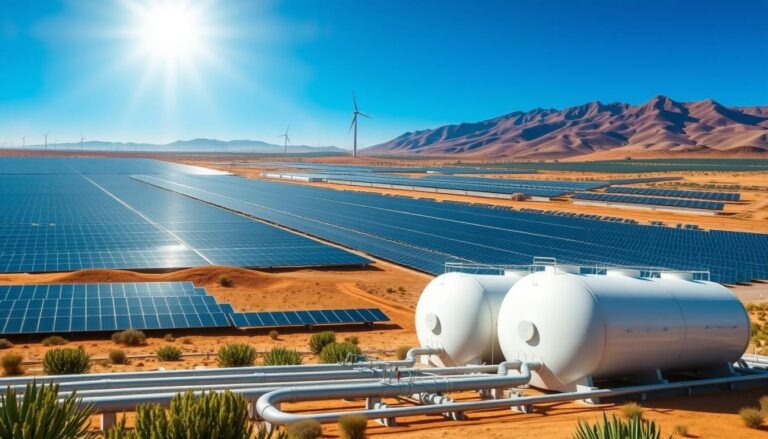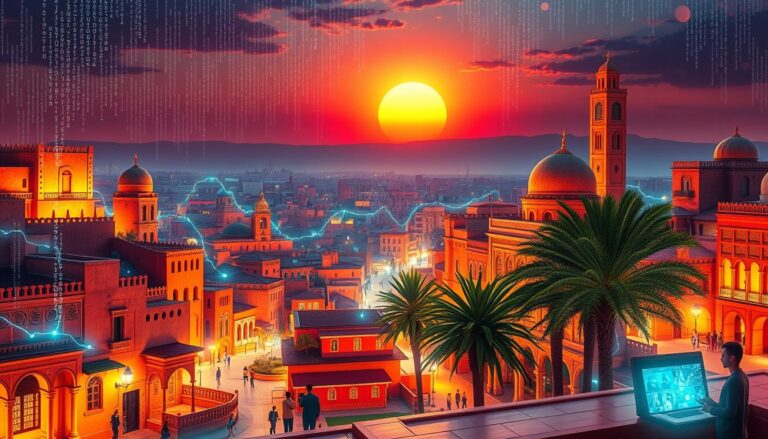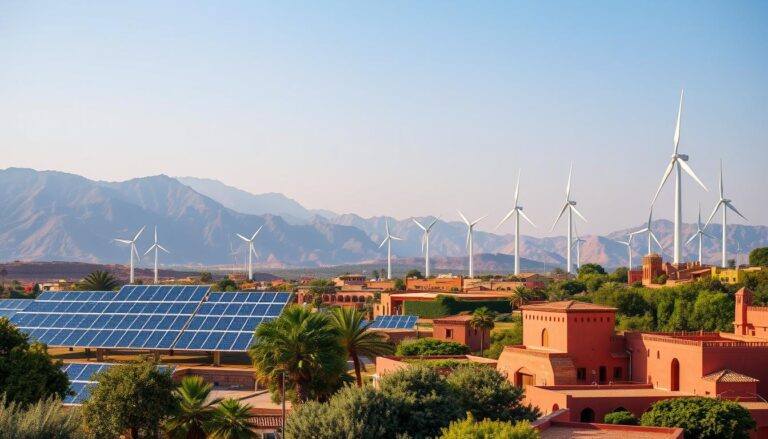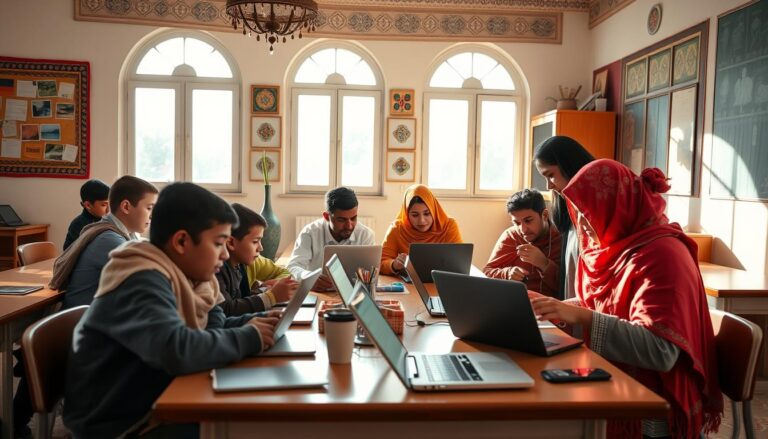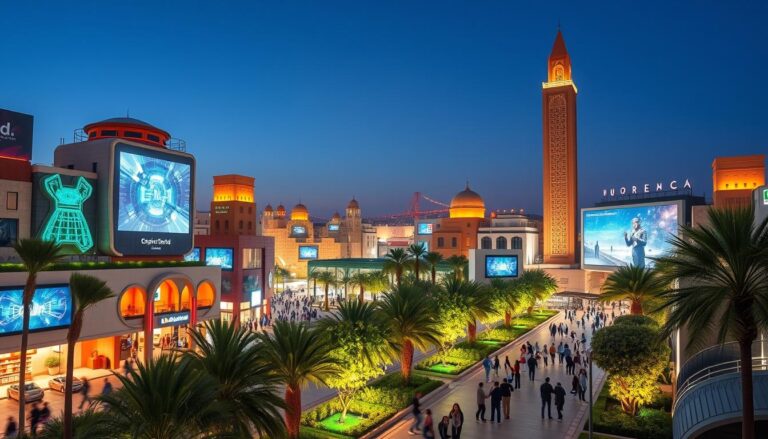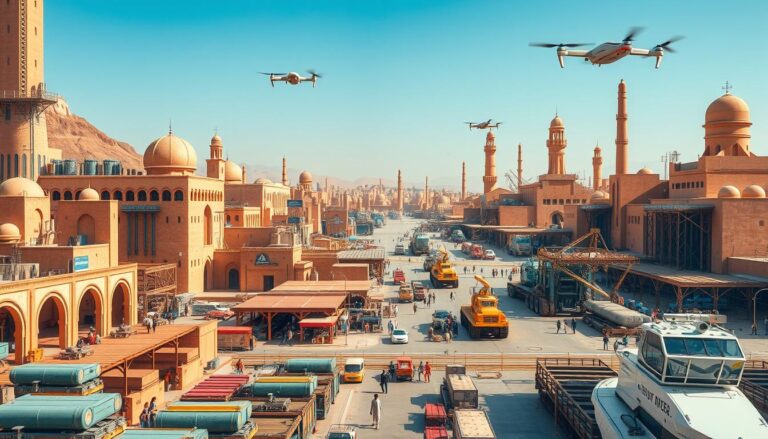Morocco’s economic growth is like a shining beacon in the vast expanse of North Africa, illuminating the region with its remarkable progress. With a strategic location and a commitment to diversification, Morocco has become a prime example of how effective policies and investments can drive sustainable development.
One key driver of Morocco’s economic growth is its successful diversification efforts. By reducing its reliance on traditional sectors such as agriculture, Morocco has paved the way for new opportunities and industries to flourish. This diversification strategy has not only boosted economic growth but also created jobs and improved living standards for its citizens. With an emphasis on sectors such as renewable energy, manufacturing, tourism, and services, Morocco has established itself as a dynamic player in the global economy.
Furthermore, Morocco’s strategic location at the crossroads of Europe, Africa, and the Middle East has attracted significant foreign investment. The country’s stable political climate and favorable business environment have made it an attractive destination for multinational corporations seeking to expand their operations. These foreign investments have not only brought capital into the country but also transferred knowledge and technology that have further fueled Morocco’s economic growth.
In conclusion, Morocco’s economic growth stands out as a beacon in North Africa due to its successful diversification efforts and strategic location attracting foreign investments. Through these initiatives, Morocco has experienced remarkable progress in various sectors such as renewable energy, manufacturing, tourism, and services. Its achievements serve as an inspiration for other countries in the region looking to drive sustainable development through effective policies and investments.
Key Takeaways
- Morocco’s economic growth is driven by diversification into sectors like renewable energy, manufacturing, tourism, and services.
- The strategic location of Morocco attracts significant foreign investment, which brings capital, knowledge, and technology to the country.
- Economic diversification has reduced vulnerability to external shocks, leading to stability and sustained growth.
- Morocco’s well-developed infrastructure and favorable business environment make it an attractive logistics hub and a key player in international trade and investment.
Diversification as a Key Driver of Economic Growth
You can’t rely on a single industry for economic growth; diversification is the key to unlocking Morocco’s true potential. Economic diversification refers to the process of developing multiple industries and sectors within an economy, reducing reliance on a single sector.
In the case of Morocco, this means moving away from being heavily dependent on agriculture and tourism, and exploring other sectors such as manufacturing, renewable energy, and technology. By diversifying its economy, Morocco can achieve sustainable growth that isn’t susceptible to external shocks or fluctuations in a single industry.
One of the main advantages of economic diversification is stability. When a country relies too heavily on one industry, any downturn or crisis in that sector can have severe consequences for the entire economy. By developing multiple industries, Morocco can distribute risks more effectively and cushion itself against external shocks. This will lead to greater resilience during economic downturns and ensure sustained growth over the long term.
Furthermore, economic diversification can lead to increased investment opportunities and job creation. As new industries emerge and grow in importance, they attract both domestic and foreign investment. This influx of capital stimulates economic activity and creates employment opportunities for the local population. For instance, by investing in renewable energy projects like solar power plants or wind farms, Morocco not only reduces its dependency on fossil fuels but also opens up avenues for innovation, technological advancements, and job creation.
In conclusion, economic diversification is essential for unlocking Morocco’s true potential. By reducing reliance on a single industry through the development of multiple sectors such as manufacturing, renewable energy, and technology, Morocco can achieve sustainable growth that is resilient to external shocks. This approach will attract investments, create employment opportunities, and position Morocco as an attractive destination for businesses seeking new markets.
Transitioning into the next section about ‘strategic location and foreign investments’, Morocco’s diversified economy makes it even more appealing for foreign companies looking to establish themselves in North Africa’s growing market.
Strategic Location and Foreign Investments
To capitalize on its unique position, Morocco has strategically positioned itself as a gateway between Europe, Africa, and the Middle East. This advantageous location has enabled the country to attract significant foreign investments from multinational corporations seeking to establish a foothold in these regions.
Furthermore, by fostering a thriving business environment through favorable investment policies and infrastructure development, Morocco has successfully created an attractive destination for both domestic and international businesses looking to expand their operations.
Capitalizing on its Unique Position
Explore how Morocco’s unique geographical location has allowed it to capitalize on its strategic position as a gateway between Europe and Africa, fueling its impressive economic growth. Situated at the crossroads of Europe, Africa, and the Middle East, Morocco has leveraged its geographic advantages to become a key player in international trade and investment. Its proximity to major European markets provides unique opportunities for businesses looking to tap into both continents. The country’s well-developed infrastructure, including modern ports and airports, further enhances its appeal as a logistics hub for regional and global supply chains.
To illustrate Morocco’s strategic position, consider the following table:
| Economic Advantages | Unique Opportunities |
|---|---|
| Proximity to Europe | Access to African markets |
| Strong transport links | Emerging middle class |
| Stable political environment | Growing tourism industry |
| Free trade agreements with multiple countries | Expanding renewable energy sector |
As shown above, Morocco’s geographical location offers numerous economic advantages that have contributed to its remarkable growth. By capitalizing on these opportunities, the country has attracted significant foreign investments and diversified its economy beyond traditional sectors such as agriculture. Moving forward into the next section about attracting foreign investments, it is important to understand how Morocco’s strategic positioning forms a solid foundation for continued economic development.
Attracting Foreign Investments
Attracting foreign investments is a crucial aspect of leveraging Morocco’s strategic position as a gateway between Europe and Africa. The country has implemented various economic reforms to create an attractive environment for foreign direct investment (FDI).
In recent years, Morocco has witnessed a significant increase in FDI inflows, which have played a vital role in driving the country’s economic growth. According to data from the World Bank, FDI inflows to Morocco reached $3.6 billion in 2019, representing an increase of 34% compared to the previous year.
To attract foreign investments, Morocco has implemented several key reforms aimed at improving its business climate. These reforms include simplifying administrative procedures, reducing bureaucracy, and enhancing transparency and accountability. Additionally, the Moroccan government has established special economic zones and industrial parks that offer tax incentives and other benefits to attract foreign investors. These efforts have paid off, as evidenced by the increasing number of multinational companies setting up operations in Morocco.
Transitioning into the subsequent section about fostering a thriving business environment, creating an attractive investment landscape is just one step towards achieving sustained economic growth. To fully capitalize on its unique position, Morocco must also focus on fostering a thriving business environment that promotes innovation and entrepreneurship while ensuring social inclusivity and sustainable development.
Fostering a Thriving Business Environment
You may think that creating a thriving business environment is just about attracting investments, but it’s actually a complex process that requires a delicate balance of innovation, inclusivity, and sustainability.
To truly thrive in entrepreneurship, it is essential to have a supportive ecosystem that fosters growth and encourages collaboration. In Morocco, the government has recognized the importance of nurturing such an environment and has implemented several initiatives to facilitate business development.
To start with, Morocco has made significant improvements in its business regulations over the years. The country has streamlined administrative processes, making it easier for entrepreneurs to start and run their businesses. Additionally, Morocco has implemented reforms to enhance its legal framework and protect intellectual property rights. This creates a secure environment for businesses to innovate without fear of infringement.
Another key aspect of fostering a thriving business environment lies in promoting innovation. Morocco has invested heavily in research and development activities across various sectors such as renewable energy, agriculture, and technology. This not only encourages entrepreneurship but also attracts foreign investors who are seeking opportunities in these growing industries.
Furthermore, inclusivity plays a crucial role in creating an environment where all businesses can thrive. The government has implemented programs to support women entrepreneurs and promote gender equality in the business sector. By providing access to funding, training programs, and networking opportunities specifically tailored for women-owned businesses, Morocco ensures that everyone has an equal chance at success.
Lastly, sustainability is embedded within the fabric of Morocco’s business ecosystem. The country recognizes the importance of protecting the environment while also driving economic growth. It promotes sustainable practices through initiatives such as green financing options for businesses that prioritize environmental conservation.
Creating a thriving business environment goes beyond just attracting investments; it requires fostering innovation, inclusivity, and sustainability. By focusing on these aspects along with favorable business regulations, Morocco paves the way for entrepreneurial success.
Impact on Overall Development
In terms of overall development, Morocco’s strategic location and foreign investments have led to consistent GDP growth. The country has experienced an average annual growth rate of around 4% over the past decade.
This sustained economic expansion has resulted in a significant reduction in poverty rates. The percentage of people living below the national poverty line dropped from 15.3% in 2007 to 4.8% in 2019.
Furthermore, Morocco’s success story serves as a beacon of hope for other nations in the region. It showcases how effective policies and targeted investments can drive economic progress and improve living standards for their citizens.
Consistent GDP Growth
Impressive, isn’t it? Morocco’s consistent GDP growth has been a source of hope and inspiration for the entire region.
Over the past decade, the country has demonstrated its commitment to sustainable development by achieving an average annual GDP growth rate of 4%. This remarkable economic performance has not only provided stability but also created numerous employment opportunities for its citizens.
To further emphasize the significance of Morocco’s consistent GDP growth, let’s look at some key data points:
-
Foreign Direct Investment (FDI): The country has attracted a significant amount of FDI, indicating investor confidence in its economy. In 2019 alone, Morocco received $3.5 billion in FDI inflows.
-
Diversification: Morocco has successfully diversified its economy beyond traditional sectors like agriculture and mining. Industries such as manufacturing, tourism, and renewable energy have experienced substantial growth and contributed to overall economic expansion.
-
Job Creation: The sustained GDP growth has led to the creation of jobs across various sectors. This has not only reduced unemployment rates but also improved living standards for many Moroccans.
Morocco’s impressive economic growth sets the stage for discussing another positive outcome – the significant reduction in poverty rates.
Significant Reduction in Poverty Rates
Progressive poverty rates plummeted as Morocco’s miraculous economic expansion paved pathways for prosperity. The country’s commitment to economic diversification has played a crucial role in this significant reduction in poverty.
By focusing on sectors beyond traditional industries like agriculture, such as tourism and manufacturing, Morocco has managed to create new job opportunities and boost income levels. According to data from the World Bank, the poverty rate in Morocco dropped from 15.3% in 2007 to 4.8% in 2019, showcasing an impressive decline over the years.
This reduction in poverty is not merely a result of luck or temporary measures but rather a testament to Morocco’s long-term vision and strategic planning. Through targeted policies that prioritize social development alongside economic growth, the government has been successful in lifting millions out of poverty.
Moreover, by diversifying its economy, Morocco has become more resilient to external shocks and fluctuations in global markets, ensuring sustained progress for its citizens.
Morocco’s remarkable achievements in reducing poverty serve as a beacon of hope for other nations in the region. Its success demonstrates that with proper governance and effective policies focused on economic diversification, it is possible to uplift communities and improve living standards significantly.
As other North African countries face similar challenges of high poverty rates and limited job opportunities, they can look towards Morocco as a shining example of how proactive measures can lead to transformative change.
Serving as a Beacon of Hope for Other Nations in the Region
By showcasing the transformative power of targeted policies and economic diversification, Morocco’s success in reducing poverty serves as a guiding light for neighboring nations in the region.
With an unwavering commitment to poverty alleviation, Morocco has made significant strides in improving the lives of its citizens. According to World Bank data, poverty rates have decreased from 15.3% in 2007 to 4.8% in 2020. This remarkable achievement is attributed to a combination of factors, including the implementation of social programs aimed at providing access to healthcare, education, and basic services.
Morocco’s success story not only demonstrates the effectiveness of its poverty reduction strategies but also serves as a beacon of progress for other nations in North Africa. By prioritizing regional cooperation and sharing best practices with neighboring countries, Morocco has set an example that inspires hope for similar progress elsewhere.
The country actively engages in initiatives such as the Arab Maghreb Union and the African Union, promoting collaboration among nations to tackle common challenges collectively.
As we transition into discussing Morocco’s success in renewable energy and manufacturing, it becomes evident that these achievements are built upon a solid foundation laid by its efforts to reduce poverty.
Success in Renewable Energy and Manufacturing
Imagine living in a country where renewable energy and manufacturing industries are flourishing, bringing hope for a brighter and more sustainable future.
In Morocco, this dream has become a reality. The country has made remarkable progress in the field of renewable energy exports, positioning itself as a leader in the region. According to recent data, Morocco’s renewable energy sector has experienced substantial growth over the past decade, with exports reaching new heights. This success can be attributed to strategic investments in solar and wind power projects, as well as favorable government policies that promote clean energy production.
Morocco’s commitment to renewable energy is evident in its impressive achievements. The country boasts one of the largest solar power plants in the world, known as Noor Ouarzazate Solar Complex. This facility alone has significantly contributed to reducing carbon emissions while providing electricity to thousands of households.
Additionally, Morocco has tapped into its abundant wind resources by establishing wind farms along its coastline. These initiatives have not only boosted domestic energy production but also allowed for surplus electricity generation that can be exported to neighboring countries.
In addition to its success in renewable energy exports, Morocco has also made significant advancements in manufacturing industries. The government has prioritized industrial development through various strategies such as attracting foreign direct investment and implementing supportive policies for local businesses. As a result, the manufacturing sector has witnessed steady growth and diversification, contributing significantly to job creation and economic expansion.
Transitioning into the subsequent section about ‘thriving tourism and services industry,’ it is clear that Morocco’s success extends beyond renewable energy and manufacturing alone. The thriving economy serves as an attractive foundation for other sectors such as tourism and services to flourish further. With infrastructure improvements and favorable investment climate already in place, these industries are poised for continued growth, contributing to overall economic stability and prosperity in the country.
Imagine living in a country like Morocco where both renewable energy exports and manufacturing industries are thriving. Such progress brings hope for a brighter and more sustainable future. Morocco’s strategic investments in renewable energy projects, coupled with favorable government policies, have propelled the country to become a leader in the region. Moreover, the manufacturing sector has experienced significant growth, generating employment opportunities and contributing to economic development.
As Morocco continues its journey towards a more prosperous future, other sectors like tourism and services are expected to thrive as well.
Thriving Tourism and Services Industry
Get ready to explore the thriving tourism and services industry in Morocco, where you can immerse yourself in rich cultural experiences and indulge in luxurious accommodations.
This North African country has witnessed tremendous growth in its hospitality sector, attracting tourists from all over the world. The combination of stunning landscapes, historical sites, and vibrant cities makes Morocco a top destination for cultural tourism opportunities.
-
Variety of Experiences: Whether you’re interested in exploring ancient medinas, relaxing on pristine beaches, or trekking through the Atlas Mountains, Morocco offers a wide range of experiences for every type of traveler. From the bustling streets of Marrakech to the serene coastal towns like Essaouira and Agadir, there is something for everyone to enjoy.
-
Rich Cultural Heritage: Morocco’s diverse history and cultural heritage provide visitors with an immersive experience unlike any other. With influences from Arab, Berber, and European civilizations, this country boasts a unique blend of traditions, architecture, and cuisine. From visiting UNESCO World Heritage Sites such as the historic city of Fez to participating in traditional Moroccan cooking classes or pottery workshops, there are countless opportunities to engage with the local culture.
-
Luxurious Accommodations: In recent years, Morocco has seen a significant increase in luxury hotels and resorts that cater to discerning travelers seeking premium accommodations. From boutique riads tucked away within ancient medinas to high-end beachfront resorts along the Atlantic coastline, visitors can expect exceptional service combined with exquisite Moroccan design elements.
-
Thriving Hospitality Sector: The growth of Morocco’s tourism industry has had a positive impact on its economy by creating job opportunities and boosting local businesses. The government has implemented policies aimed at promoting tourism investment and improving infrastructure to accommodate increasing visitor numbers.
Morocco’s thriving hospitality sector offers an abundance of cultural tourism opportunities for travelers seeking unique experiences. With its rich history and diverse landscapes coupled with luxurious accommodations and a growing array of tourist attractions, this North African gem is undoubtedly becoming a beacon for those seeking an unforgettable journey.
Conclusion
In conclusion, Morocco’s economic growth stands as a shining example for its neighboring countries in North Africa. With a strategic focus on diversification, the nation has successfully positioned itself as an attractive destination for foreign investments. This has not only boosted its overall development but also showcased the potential for other countries to follow suit.
One cannot help but appreciate the irony of Morocco’s success in renewable energy and manufacturing. While many developed nations struggle to transition to sustainable practices, this African nation has embraced it wholeheartedly. By harnessing its natural resources and investing in green technology, Morocco has become a leader in clean energy production. This achievement not only addresses environmental concerns but also creates new job opportunities and drives economic growth.
Furthermore, Morocco’s thriving tourism and services industry adds another layer of irony to its narrative. Despite being located in a region often associated with political instability and conflict, this country has managed to attract millions of tourists each year. Its rich history, vibrant culture, and beautiful landscapes have made it a popular choice among travelers from around the world.
In conclusion, Morocco serves as a beacon of hope and inspiration for other nations in North Africa. Through strategic planning, diversification efforts, and smart investments, it has achieved remarkable economic growth that benefits both the country and its people. As other countries strive to follow suit, they can look at Morocco’s success story as proof that change is possible even amidst challenging circumstances.

The Editorial Team is a passionate group of Morocco enthusiasts dedicated to sharing the beauty, culture, and wonders of this captivating country. With diverse backgrounds and a deep love for travel, we strive to bring you engaging and informative content that inspires your Moroccan adventures. From uncovering hidden gems and sharing local insights to exploring mouthwatering cuisine and showcasing the vibrant lifestyle, our team is committed to providing you with valuable resources and exciting stories that enhance your exploration of Morocco. Join us on this journey as we celebrate the rich heritage and unforgettable experiences that make Morocco truly special.

